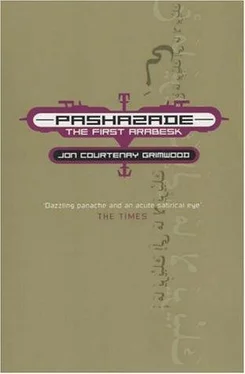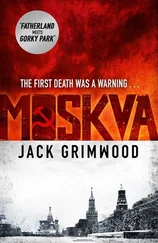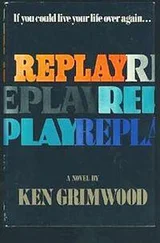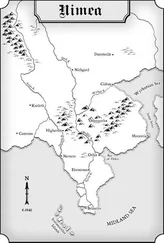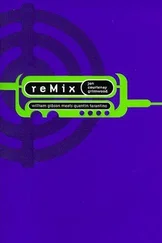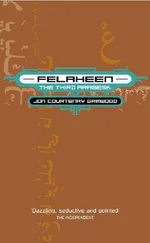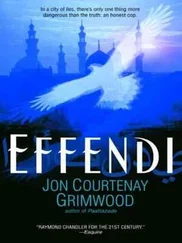He was doing his best to think about something else.
On the notebook in front of him was a list of names. The notebook was the old-fashioned kind with paper pages because that was safe. Short of looking over his shoulder or using a seriously hiRez satellite, no one could see what he was writing and he was secure in the knowledge that no pet geek of the Minister's was sitting five tables away with a hidden Van Eck phreaker, recording everything he put up on screen.
Most of the names were crossed out, but half of them had then been written in again. In the centre was his aunt, circled heavily. Radiating out from Lady Nafisa were lines leading to Hamzah, Jalila, the General, Mushin Bey, Zara ... Lines from these names led to other names until the page was a matrix of connections — all leading nowhere.
What he had was a diagram as hermetic as any kabbalistic chart and about as informative. Because, when it actually came down to it, Raf had to admit what he'd been avoiding admitting even to himself: he couldn't prove for certain it was murder. And even if it was, what chance was there that he could solve a crime from scratch and with no obvious clues.
He'd followed them all except the General, who hadn't left his house in weeks. Bought himself a digital scanner he couldn't really afford in Radio Shack and fed it Zara's number and then, in desperation, the number of the Minister and finally of Felix. The Minister hid his calls behind heavyweight crypt, Felix seemed to leave his mobile off most of the time and from Zara, once his scanner had cracked the crypt, he'd learned only that she ran a club and the GSP coordinates she gave out to selected punters indicated it was in a multi-storey garage. Which was vaguely interesting, if not helpful.
It was Wednesday, 28 July, 10.48a.m. and his heartbeat, blood pressure and alpha count were almost normal, if maybe a little on the high side. No one at the office had yet tried to call him and he'd sat outside the Gumhuriya café for thirty-five minutes — which, in direct sunlight, was thirty-five minutes too long for his genetic make-up. The heat was thirty-four degrees and for once humidity was low. All this he read off from the face of his watch. None of it really interested him.
Missing from the report was a record of the complex organic molecules gating through myriad alveoli in his lungs, flooding his blood system each time he sucked the plastic mouth piece of a small sheesha.
Tetrahydrocannabinol
The brass water pipe had bright edges. As if someone had traced neatly round its undulating body with light. The trunk of a eucalyptus, in whose shade Raf sat, was split in two at head height, then split again and again, time branching, until it ended as a luminous three-dimensional schematic, the answer to some important question no one had ever remembered to ask. He had a feeling the 'no one' might have been him.
Raf wasn't sure if he should have accepted the water pipe or not.
'Fuck it.'
A minute or so later, Raf repeated himself.
Later still, he rested the sheesha's purple tube and mouthpiece on the café table in front of him and checked his wrist. Not as much time had passed as should have done.
Swirled a glass of cooling tea with a spoon, Raf watching its brief vortex slow and die. Entropy. He was hot, his shirt was sticky and a thumb print smeared the lenses of the shades that kept the city at bay.
He was breakfasting at a felah café on Place GH, incongruous among thickset moustachioed men wearing striped shirts or long jellabas. Everybody in the place was male, apart from an elderly Tunisian woman in black who appeared every few minutes carrying plates from the kitchen, which she left at one end of the counter for a waiter to deliver. It was a face of the city he hadn't seen, where full breakfast cost half the price of a croissant at Le Trianon and the first sheesha came free.
The only reason they accepted Raf at all was because of what he wore. Though it had taken him several mornings to understand that. The jacket was long and black, and it came from the back of a cupboard on the men's floor at the madersa. It was old and had a collar of the kind that turned up rather than folded down. People glanced at him oddly in the street whenever he went out, but they still moved politely out of the way.
New clothes. The thought was random but true. However, thinking it and achieving it were different matters, because his credit card had expired along with his aunt. A fact he'd only discovered when he had tried to use it in the French boutique near Place Orabi. What little money he had was borrowed against his salary from the Third Circle, which was looking more token by the day. Apparently working for S3 was an honour; it was just a pity it wasn't one Raf could afford.
Of course, he could always ask Hamzah for a job.
Or not.
The kif in his pipe tasted sour, even though it had been cured in honey. But that's just me, thought Raf. The whole of life had turned sour the moment Felix barged into the madersa more than a fortnight back, dropped his bombshell and then gone, leaving Raf with the job of telling Hani she'd lost her aunt and now she was losing her house. Which wasn't a good thought, because it just made Raf remember that he still hadn't told her. And he really should have done.
God help her.
He couldn't eat for worrying and he didn't want to drink, no matter that spirits could probably be found in half a dozen illicit bars within five minutes' walk of somewhere like Le Trianon. As for drugs ... Leaf cured with molasses or honey was hard to avoid in this part of the city. Kif was sold ready-rolled by hawkers on every street corner and as huge, wood-stamped blocks in the suqs around el Magharba. But despite today's sheesha, dope had never really been his style and when he did break with the fox's good intentions, he used amphetamines. The basic kind cooked up in basements. Speed made him feel the fox more strongly.
But Isk ran at the wrong speed for sulphate. And while coke could undoubtedly be found behind the black glass doors of expensive nightclubs, just as dance drugs could be had in the tourist haunts, which filled nightly with German kids whacked out on substances a mere molecule away from MDMA, finding fuel to feel the fox had proved more difficult.
Besides, the fox was dying. Raf was pretty sure of that. It spoke less and less often and mostly after dark. It didn't talk to him the way it used to and it had offered no advice on how to find his aunt's killers, not even bad advice. Most of the time, when Raf went looking inside his head for the animal, he found only flickering facts and an emptiness where the voice used to be. And all taking the sheesha had done was add an echo to that emptiness. An echo of silence at odds with the street noise around him.
To Raf's right was the neo-baroque monstrosity of Misr Station, terminus for the A/C turnini that ran through from Cairo. From above, the tracks looked toylike and the dusty square seemed small, crowded and dirty, set between an overflowing taxi rank and a sprawl of flat roofs broken occasionally by the spiky minaret of a mosque, the breastlike dome of a Coptic basilica or the spire of a Catholic church.
Higher still, the individual buildings blurred into a street plan that revealed only roads and blocks of solidified city life. The darker alleys, where the sun daily lost its battle against shadow, faded out until even el-Anfushi's widest streets showed only as hairline cracks that finally blurred and vanished. Raf's throat was too tight and getting tighter as he fought against the thinness of atmosphere, fought for breath.
'Your Excellency?'
The city span up to hit him, hard and fast. And Raf had to slam one hand on top of the other to stop both from shaking. He didn't feel very excellent about anything.
Читать дальше
